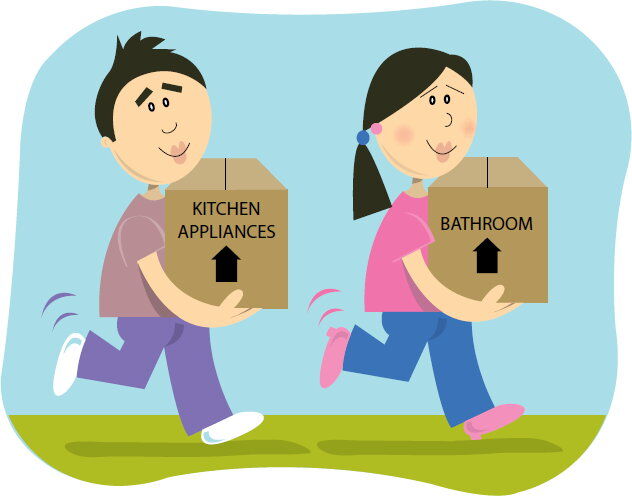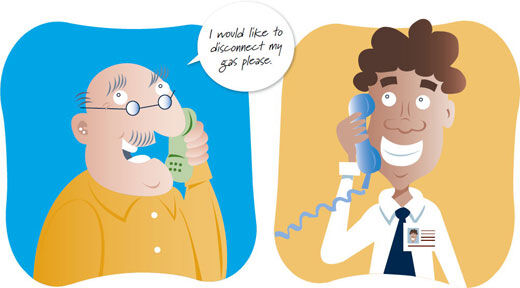
Moving in
When you move into a property, the property may:
- not be attached to the distribution network;
- be attached but the electricity or gas is ‘turned off’; or
- be attached and the electricity or gas is ‘turned on’.
If your property is not attached to the distribution network
To supply energy, gas pipelines or electricity wires must attach your property to the local distribution network. Some properties (mostly newly built properties) may not be attached to the distribution network.
To have your property attached to the network and receive supply, you must contact a retailer. Your retailer will open an account for you and advise the distributor that your property requires attachment.
To have your property attached to the electricity or gas network, but not receive supply yourself (for example, if you intend to rent the property out), you may contact either your distributor or retailer.
If your property is located within a certain distance from the distribution network (100m for electricity and 20m for gas) and you have met the conditions of the distributor, the distributor must attach your property. Electricity attachments must be established within 20 business days, unless you agree in writing to a later date. New residential gas attachments will generally be established within five business days.
If a gas pipeline is available outside your property, ATCO Gas Australia will install up to 20 metres of gas pipe from your property boundary to your meter box, free of charge. Certain conditions apply.
Your distributor or retailer will advise you if you must pay the cost for attaching your property to the network. The law does not specify the exact amount distributors may charge for attaching your property.
For more information on the costs and conditions of attaching your property, contact your retailer or distributor.
If your property is attached, but your electricity or gas is ‘turned off’
Sometimes a property is attached to the distribution network, but the electricity or gas supply has been ‘turned off’ (disconnected) by the retailer or distributor.
In this case, you must contact a retailer to open an account. Your retailer will then arrange for the energy to your property to be ‘turned on’ (connected).
Maximum timeframes for connection:
| Connection timeframes |
| electricity customers (metro) |
within 2 business days |
| electricity customers (regional) |
within 6 business days |
| gas customers (regardless of location) |
within 2 business days of your distributor receiving a request from your retailer to connect your property.
|
If your property is attached and your electricity or gas is ‘turned on’
If you move into a property and the electricity or gas is already ‘turned on’, you must still contact a retailer to open a new account.
If you don’t contact your retailer and your retailer becomes aware that you have been using energy, the retailer can bill you for all the energy you used from the time you moved in.
Check for concessions and rebates
Do you use life support equipment?
If you have life support equipment in your home for yourself or someone who lives there, you should inform your retailer. When you tell the retailer and give evidence from a doctor that life support equipment is needed, you will be registered as having life support equipment. If registered, you will not be disconnected for non-payment while the person using the equipment resides at your address. If there is a planned interruption to supply, you will be given at least three business days’ notice and the distributor will use its best endeavours to obtain your acknowledgement that the notice has been received.
You may be eligible for a state government subsidy for the cost of electricity. To find out whether you are eligible, ask your retailer or contact the Office of State Revenue on 08 9262 1373 or via its website www.finance.wa.gov.au.
Moving out
You must tell your retailer when you plan to leave your property. If you tell your retailer at least five days before you move out, you will not have to pay for any energy used after you leave.
If you tell your retailer less than five days before leaving, or after leaving, you may have to pay for energy used at the old address for up to five days after you told the retailer.
If you are the person named on the account and you do not give notice that you are moving out, you will continue to have to pay for energy used at the property – even after you have left. Your responsibility for the account still only ends five days after you give notice.
If you are not the account holder, you do not have to pay for energy used at the property, but, if the account holder gives notice and you continue to use energy, you will be ‘deemed’ to be the account holder for the property. This means that you have to pay for energy consumed after the notice period from the last account holder ends.
If you are the person named on the bill and you move out, tell your retailer, otherwise you may be responsible for energy costs, even if you are no longer living in the property.
Retailer checklist
Let your retailer know if:
- You have moved into a property. If you don’t, you may be billed for any energy you consumed since you moved in when the retailer finds out that you are living there.
- You are planning to move out of a property. If you tell your retailer at least five days before you move out, you will not have to pay for any energy consumed after you leave.
- The previous account holder has moved out of the property. You will need to set up a new account.
- Someone in your home uses life support equipment. You will be registered and receive special protection in regard to disconnections once you supply evidence from a doctor that you need that life support equipment.
- You cannot pay your bill on time. Your retailer may be able to help you.
- Access to your meter is a problem (e.g. locked gates). Your retailer may be able to provide an alternative meter reading arrangement so you will not receive estimated bills.
- You think your bill is too high. Your retailer can check the bill, order a meter test if needed and provide you with information on how to reduce your energy usage.
- You have a complaint. Your retailer should be able to help solve your problem.
- You have a concession card (Health Care Card, Veterans’ Affairs Gold Card [War Widow, Dependent, Totally and Permanently Incapacitated], Pensioner Concession Card, Commonwealth Seniors Health Card, Commonwealth Seniors Card or WA Seniors Card), as you will usually be eligible for a discount on your bill.
This information applies to small use customers. You are a small use customer if you use less than 160MWh (about $56,000) of electricity per year or up to 1TJ of gas per year (between $28,500 and $43,000, depending on where you live).

